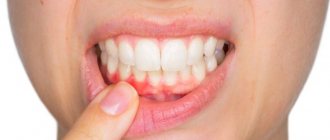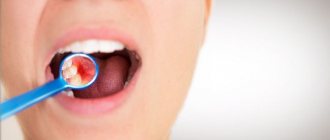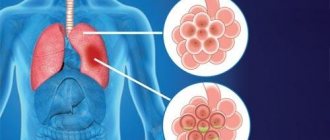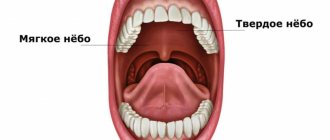Bad breath: physiology or disease?
Bad breath
in medical language it is called
halitosis
. There are physiological and pathological halitosis. Bad breath often appears in the morning. During the night, bacteria and their metabolic products accumulate in the mouth, which causes a bad odor. This type of halitosis is physiological and can be eliminated by simply brushing your teeth. Physiological halitosis also includes odor caused by eating a number of foods, such as garlic, onions, cabbage. This smell will disappear on its own as soon as the substances that caused it are eliminated from the body. But it also happens that an unpleasant odor is not eliminated using hygiene procedures; in this case, most likely, it is of a pathological nature.
Solution
The basis of therapy for bad breath due to the stomach is, first of all, the correction of diet and nutrition. So, to treat the stomach, exclude foods that irritate the mucous membrane (onions, garlic, etc.) from the daily menu, give up alcohol and smoking, normalize the drinking regime (2–2.5 l), completely (or at least partially) exclude fried foods , fatty and other “heavy” dishes.
This therapeutic measure is complemented by sanitation of the oral cavity and, if necessary, hygienic cleaning in the dental office (many gastric diseases cause excessive accumulation of bacterial plaque on the tongue and gums, which in itself is the cause of halitosis). Complex treatment of abnormal processes in the stomach includes taking enterosorbents, anti-inflammatory drugs, enzymes, and, if necessary, antibacterial agents.
Gastritis - inflammation of the gastric mucosa - is the most common “provocateur” of rotten breath
The list of medications prescribed for gastric halitosis may include:
- Almagel (removes toxins and waste, prescribed for high acidity, relieves abdominal pain).
- Omeprazole (improves intestinal motility).
- Pancreatin (Festal) – pancreatic enzymes necessary for high-quality digestion of food.
- Ursosan (normalizes the acid-base balance of gastric juice).
- Amoxicillin (broad-spectrum antibacterial drug).
Folk remedies
Auxiliary therapy for gastric halitosis may consist of taking an infusion of sage and chamomile (1 tablespoon of dry herbs/glass of water). This medicinal composition is drunk orally or used for medicinal rinses (every 3 hours + after each meal). The infusion of strawberry leaves also normalizes the functioning of the stomach. Prepare it as follows: 1 tbsp. l. vegetable raw materials are steamed with a glass of boiling water and left for 30 minutes under the lid. The strained product is used to rinse the mouth.
Important! Seeds of dill, fennel, and parsley not only have a positive effect on digestion, but also help remove foul odor from the mouth. It is recommended to chew them 2-3 times a day.
For gastritis, ulcers, enzyme deficiency, dysbacteriosis, acid reflux and other digestive diseases, you should pay attention to flaxseed. So, every morning you need to steam 3 tbsp. l. of this product with a glass of boiling water. Drink the finished medicine ½ glass twice a day half an hour before meals.
St. John's wort is a medicinal plant with anti-inflammatory and antiseptic properties. Decoctions and infusions based on it not only have a positive effect on the functioning of the stomach, but also help prevent various dental problems. To combat halitosis, it is recommended to replenish your home medicine cabinet with the following medicinal herbs:
- oak bark;
- calendula flowers;
- calamus root;
- eucalyptus.
Another useful recipe for halitosis:
- 300 ml boiled water;
- 1 tsp each cinnamon powder, cloves, chopped peppermint;
- 2 tsp. finely chopped parsley.
How to prepare the medicine: put a pan of water on the fire, bring to a boil, add dry ingredients, simmer over low heat for 5 minutes. After this, the mixture is removed from the stove, filtered, cooled, and stored in the refrigerator. Use mouthwash every time you need to freshen your breath.
Only comprehensive instrumental and laboratory diagnostics can reveal the true causes of foul odor from the mouth.
It is useful to rinse your mouth with an aqueous solution of apple cider vinegar (1:1), the procedure is carried out no longer than 1-2 minutes/time. The use of any folk remedies for terrible putrid breath in stomach diseases is recommended to be discussed with your doctor.
Bad breath: causes
The most common cause of unpleasant odor is the active activity of pathological bacteria in the oral cavity. Diseases such as caries, periodontitis, pulpitis, periodontitis, gingivitis, stomatitis, as well as the formation of tartar can lead to persistent bad breath.
The second place among the causes of unpleasant odor is dry mouth (the medical term is xerostomia
). Mica, which moisturizes our mouth, has bactericidal properties. It kills bacteria, neutralizes their waste products, rinses and cleanses the oral cavity. If there is not enough saliva produced, bacteria are activated, resulting in an odor. Dry mouth can be a consequence of illness or taking a number of medications. It can also be caused by age: over time, the salivary glands begin to work less intensively, the composition of saliva changes, and its antibacterial properties are lost.
The smell can also be caused by ENT diseases: sore throat, chronic tonsillitis, sinusitis, runny nose.
Another cause of unpleasant odor is diseases of the internal organs. It can be:
- renal failure;
- liver failure;
- gastric diseases (gastritis, stomach ulcer);
- lung diseases.
Smoking is also a cause of persistent bad breath. The smell is caused by substances contained in tobacco smoke and deposited in the oral cavity. The only way to eliminate the unpleasant odor in this case is to quit smoking.
What is bad breath like?
Peculiarities of odor can indirectly indicate the source of problems.
Hydrogen sulfide smell
(the smell of rotten eggs) indicates rotting protein substances. This smell is typical for digestive problems. A persistent hydrogen sulfide odor may indicate gastritis with low acidity or a stomach ulcer.
Sourish smell
and a corresponding taste in the mouth is noted with gastritis with high acidity. This smell may appear at an early stage of the disease, when other symptoms are not yet present.
Bitter smell
and the taste in the mouth is typical of liver and gallbladder diseases. An additional symptom is the appearance of a yellow coating on the tongue.
Smell of acetone
and the accompanying sweet taste in the mouth is a characteristic symptom of diabetes.
Urine smell
from the mouth indicates a disease of the genitourinary system (primarily the kidneys or bladder).
Stool smell
from the mouth can occur due to intestinal diseases (dysbacteriosis, intestinal dyskinesia, intestinal obstruction).
Putrefactive
bad breath is typical for dental diseases (inflammatory processes of teeth and gums).
Which doctor should I contact?
If an unpleasant odor appears, the first step should be a visit to the dentist. This doctor will be able to help in the vast majority of cases. If no problem is detected, it is the turn of a nutritionist and gastroenterologist. Most likely, in this case, you will have to take additional blood and urine tests. Depending on the results obtained, a specific specialist will treat the problem: for problems with the thyroid gland - an endocrinologist, for kidney diseases - a urologist, for pathologies of the respiratory system - an ENT specialist or a pulmonologist.
You can get rid of an unpleasant odor only by establishing an accurate diagnosis. Therefore, if the problem persists longer than 2-3 days, it’s time to start an examination!
Author: Elena Kopylova Dentist-therapist, endodontist. Work experience more than 8 years.
The information is for reference only. Before treatment, consultation with a doctor is necessary.
Bad breath: what to do?
The fight against bad breath begins with careful adherence to good oral hygiene. If the source of the odor is bacterial activity, proper brushing of your teeth will help. Teeth should be brushed not only from the outside, but also from the inside, and also treat the chewing surface of the teeth. The brush angle should be 45°. Using dental floss, hard-to-reach areas between teeth are treated. If your teeth are in poor condition, simply brushing your teeth will not solve the problem. You will need to visit a dentist and remove tartar, and if your teeth have caries, cure them. It is recommended to visit the dentist at least once or twice a year.
It is also necessary to combat dryness of the oral mucosa. If you feel dry mouth, take a few sips of water and rinse your mouth. However, it should be remembered that frequent dry mouth can be a symptom of serious diseases. However, like the unpleasant smell itself. Therefore, if you have persistent bad breath, you should definitely see a doctor and undergo an examination.
Treatment of heartburn
- Correction of the diet - do not overeat (especially at night), the last meal is 2.5-3 hours before bedtime, the interval between meals is 4-5 hours, the portions are small.
- Eliminate from the diet all foods that cause heartburn - fatty, fried, spicy, citrus fruits, coffee, alcohol, fresh vegetables and fruits, avoid chewing gum (increases the secretion of gastric juice).
- Allowed dishes: soups, boiled lean meat and fish, porridge (oatmeal, rice, buckwheat), yoghurt, milk (low-fat sour cream, ice cream, cottage cheese in limited quantities), baked apples, boiled vegetables.
- Sleep hygiene is to sleep on your left side with the head of the bed raised. Elevating your upper body by 15% will reduce your risk of heartburn by 50%.
- Symptomatic therapy - before meals, take drugs that neutralize acid (antacids, alginates). It should be remembered that some of them (for example, Almagel) are not recommended for children, and the duration of their use is limited.
- Correction of high gastric acidity and treatment of GERD - proton pump inhibitors.
- Improving the motor function of the gastrointestinal tract - prokinetics (required as prescribed by a doctor; they have serious side effects).
- Antibacterial therapy - when Helicobacter is detected, two or three antibiotics are combined.
- Means for improving digestion - enzymatic preparations.
- General strengthening therapy - vitamins, probiotics.
- Surgical treatment - for severe GERD, gastric ulcers that are refractory to drug therapy.
Drugs for the treatment of heartburn and the underlying disease are selected on an individual basis. Not a single, even the most effective drug will help get rid of heartburn without following a diet.











